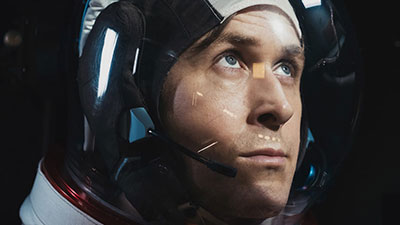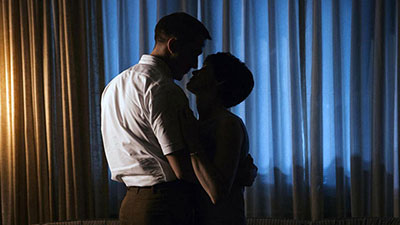Movie Review: First Man

When First Man premiered at the Venice Film Festival last month, it was showered with praise and also a Miami-based controversy no one saw coming.
 After it was revealed that the famous planting of the American flag during the 1969 moon landing was omitted from the film, which tells the story of Neil Armstrong, Florida senator Marco Rubio took to Twitter to express his outrage at the film’s perceived lack of patriotism.
After it was revealed that the famous planting of the American flag during the 1969 moon landing was omitted from the film, which tells the story of Neil Armstrong, Florida senator Marco Rubio took to Twitter to express his outrage at the film’s perceived lack of patriotism.
But Rubio, like the many that seized on this one small detail, had yet to see the film. If he had, one could only imagine that he would have seen the movie for what it was: human, contemplative, and undeniably patriotic in a time our country needs it most.
First Man was directed by the incomparable Damian Chazelle, who wrote and directed the Oscar-winning films Whiplash and La La Land. So right out of the gate it’s worth mentioning that Chazelle’s latest shares very little DNA with those two beloved films that came before it. If Whiplash is remembered for its manic energy, and La La Land for its bursting colors and buoyant soundtrack, First Man is notable for its silence. Pensive and cerebral, the film takes its aesthetic approach directly from the disposition of the historical figure at its center. As Armstrong, Ryan Gosling gives a performance that’s both emotionally affecting and minimalist. His take on Armstrong, who we see was deeply changed by his young daughter’s death at the very start of the film, is that of a man who has withdrawn into himself. But if First Man has one key element that makes it a perfect fit for Chazelle, it’s this: First Man, like the director’s last two films, is about the quest for greatness. In all his quiet solitude, Gosling’s Armstrong has a fire burning in him. Sometimes it’s expressed by just a fleeting look, but we never doubt the determination that drives him towards being the first man to set foot on the lunar surface, despite the real possibility that he might not make it back alive.
 First Man moves at a decidedly slow pace, a fact that didn’t bother me in the slightest during its impressive first hour. But at 2 hours and 20 minutes, its meditative nature started to wear increasingly thin. Filled to the brim with close-ups and a score that stays fairly low key, it isn’t so much a disappointment as it is underwhelming. Much of it is the antithesis to the sort of “rah rah” excitement we’ve come to expect from films about historic achievements. For better or for worse, we’re linked to Neil from start to finish. It’s a somber partnership we the viewers share with him. And it might not be the one that’s the most crowd-pleasing or cinematic, but it’s one that feels mostly true.
First Man moves at a decidedly slow pace, a fact that didn’t bother me in the slightest during its impressive first hour. But at 2 hours and 20 minutes, its meditative nature started to wear increasingly thin. Filled to the brim with close-ups and a score that stays fairly low key, it isn’t so much a disappointment as it is underwhelming. Much of it is the antithesis to the sort of “rah rah” excitement we’ve come to expect from films about historic achievements. For better or for worse, we’re linked to Neil from start to finish. It’s a somber partnership we the viewers share with him. And it might not be the one that’s the most crowd-pleasing or cinematic, but it’s one that feels mostly true.
No matter how you feel about the film that came before it, everything changes when we get to that final majestic moment. Justin Hurwitz’s score finally comes to the forefront, and the camera opens up. And something as simple as a shot of a footprint on the moon’s powdery surface brought a tidal wave of emotion. First Man foregoes thrills in favor of an intimate picture of a great man – and in the end, falls just a small step short of being a truly great film.
First Man is now playing in Miami theaters. For showtimes, click here

Lauren Cohen was born and raised in Miami Beach and graduated from the University of Miami with a bachelor’s degree in Motion Pictures. She has been writing about film since 2009, with her movie reviews and features appearing regularly in Examiner.com and Miami Beach News, among others. She’s interviewed some of the most recognizable faces in the film industry, including Daniel Craig, Emma Stone, Channing Tatum, Joseph Gordon-Levitt and Javier Bardem. An avid supporter of the arts, Lauren also works with the Miami Film Festival to promote the best of world cinema to the Miami community.


